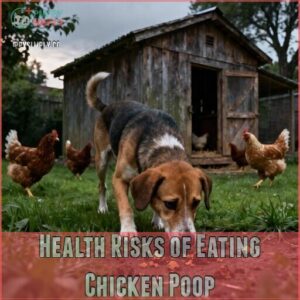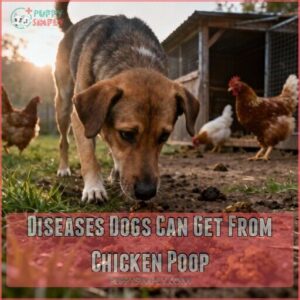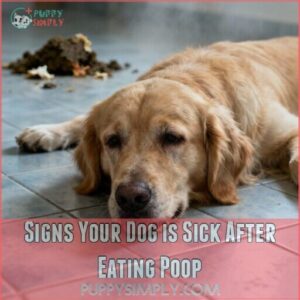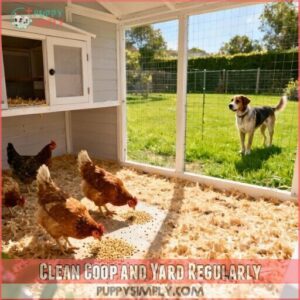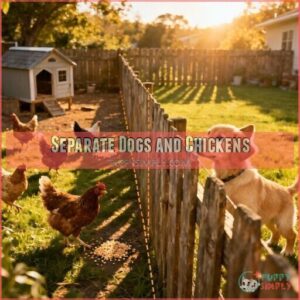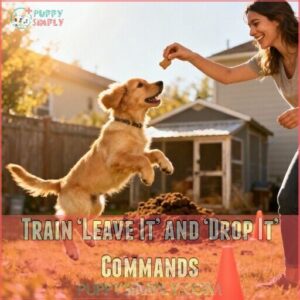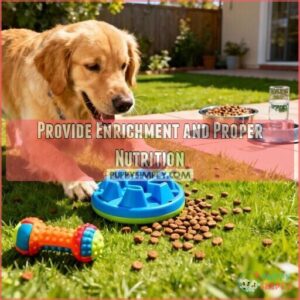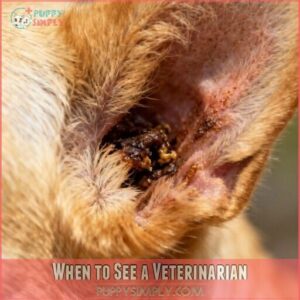This site is supported by our readers. We may earn a commission, at no cost to you, if you purchase through links.
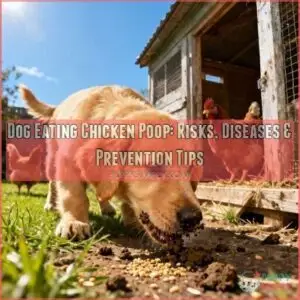
The trouble is, this habit packs more risk than you’d think—bacteria, parasites, and even nasty viruses can lurk in that mess. Whether your dog’s a curious pup or a seasoned scavenger, knowing what’s hiding in chicken droppings can help you keep him safe and healthy.
Here’s what every dog owner needs to know before the next backyard snack attack.
Table Of Contents
- Key Takeaways
- Why Do Dogs Eat Chicken Poop?
- Health Risks of Eating Chicken Poop
- Diseases Dogs Can Get From Chicken Poop
- Signs Your Dog is Sick After Eating Poop
- Preventing Dogs From Eating Chicken Poop
- When to See a Veterinarian
- Frequently Asked Questions (FAQs)
- What happens if my dog eats chicken poop?
- How do I make my dog stop eating chicken poop?
- Can dogs get sick from backyard chickens?
- Is chicken manure poisonous for dogs?
- Are there any products that are safe for a dog to eat that contain chicken?
- Are there any other animals that can get sick from eating chicken poop?
- How long does chicken poop take to digest?
- Can chicken poop eating cause bad breath?
- What deterrent sprays work best for chicken poop?
- Can dogs develop chicken poop eating addiction?
- Conclusion
Key Takeaways
Chicken poop can carry dangerous bacteria, parasites, and fungi that may make your dog sick.
Dogs often eat chicken poop because of boredom, stress, or missing nutrients in their diet.
Watch for signs like vomiting, diarrhea, and lethargy after your dog eats chicken droppings, and call your vet if symptoms persist.
Keeping the coop clean, training "leave it" commands, and separating dogs from chickens are the best ways to prevent poop eating.
Why Do Dogs Eat Chicken Poop?
If your dog keeps sniffing around the chicken coop and coming back with a guilty look, you’re not alone. This behavior is more common than you’d think, and there are a few solid reasons behind it.
Let’s break down what drives dogs to eat chicken poop in the first place.
Coprophagia in Dogs
Coprophagia—the technical term for poop-eating—is more common than you’d think, with studies showing that about 16% of dogs regularly help themselves to a fecal snack. What’s even more interesting is that most coprophagic dogs prefer fresh droppings less than two days old.
This fecal attraction isn’t just random dog behavior—it’s connected to:
- Gut microbiome curiosity and dietary connection
- Puppy coprophagia as learned behavior
- Breed prevalence in certain hunting dogs
- Instinctive scavenging patterns from wolf ancestors
Understanding why your dog eats poop helps you tackle dog health issues before they become serious problems.
Nutritional Deficiencies
While coprophagia has behavioral roots, it’s often tied to nutritional deficiencies your dog might be missing. Studies show 57% of commercial dog foods fall short on iodine, and only 16% meet all mineral guidelines. These gaps in mineral bioavailability can trigger poop-eating as your dog instinctively seeks nutrients.
Dogs with enzyme disorders like pancreatic insufficiency struggle to absorb nutrients despite eating well, making chicken poop seem like a supplement. Poor diet composition creates an unbalanced diet that impacts survival—dogs with zinc deficiency from intestinal issues lived nearly half as long as those without it.
Some dogs may eat feces to address bacterial deficiencies in their gut.
Behavioral and Environmental Factors
Sometimes the issue isn’t what’s missing from your dog’s bowl—it’s what’s happening in their head or around the chicken coop. Behavioral and environmental factors drive coprophagia just as much as nutrition:
- Boredom Relief – Dogs left alone near chickens explore droppings for stimulation
- Stress Reduction – Anxiety in dogs triggers compulsive eating behaviors
- Learned Behavior – Puppies mimic older dogs eating feces
- Territory Marking – Some dogs consume waste to claim outdoor spaces
- Dietary Influence – High-carb diets increase stool-eating frequency
Positive reinforcement techniques and proper dog training methods can redirect these dog behavior problems effectively.
Breed Predispositions
Not every dog treats chicken poop like a backyard buffet, but certain breeds seem hardwired to snack on it more than others. Herding breeds like Border Collies, scent hounds including Beagles, and terrier breeds show higher rates of coprophagia. Guarding breeds and toy breeds vary, but any dog can develop this habit.
Dog breed predispositions stem from ancestral scavenging instincts tied to survival.
Health Risks of Eating Chicken Poop
When your dog snacks on chicken poop, they’re not just dealing with something gross—they’re exposing themselves to real health threats. Chicken droppings can harbor bacteria, parasites, fungi, and other pathogens that can make your dog sick. Here’s what you need to watch out for.
Bacterial Infections (e.g., Salmonella)
Bacterial infections top the list of concerns when your dog snacks on chicken droppings. Salmonella is the big worry here. Studies show Salmonella prevalence rates of 30% in dogs exposed to raw chicken material, compared to 0% in those eating commercial diets.
Even healthy dogs can carry and shed this bacteria without showing clinical signs, creating zoonotic risk for your family. What’s worse, antibiotic resistance is climbing—60% of canine Salmonella isolates now resist common antibiotics, making disease transmission a serious public health issue. Dogs can contract the infection through contaminated raw chicken.
Parasitic and Worm Infestations
Beyond bacteria, chicken droppings harbor a lineup of parasites and worms that can turn your backyard into a transmission zone for your dog. Roundworms, tapeworms, and coccidia thrive in chicken feces and cause worm infestations that trigger parasite symptoms like diarrhea, weight loss, and a dull coat.
Your vet can spot parasitic infections through fecal exams and recommend a deworming schedule. Preventative medications keep worm infections at bay when your dog can’t resist the temptation.
Fungal and Viral Exposure
Chicken feces carry fungal spores and viruses that can slip past your dog’s defenses and cause infections you don’t see coming. Histoplasma transmission, Cryptococcus infection, and Aspergillus exposure lead to respiratory mycoses that attack the lungs and spread systemically. Here’s what you’re up against:
- Cryptococcus fungi thrive in chicken droppings and cause severe fungal infection in the brain and lungs
- Histoplasma spores trigger respiratory diseases that mimic pneumonia
- Aspergillus grows in contaminated areas and damages nasal passages
- Avian flu and other viruses shed through feces pose zoonotic risks
Viral shedding in chicken waste means your dog can contract diseases that jump from birds to mammals.
Gastrointestinal Upset and Vomiting
Your dog’s stomach wasn’t made to process chicken droppings, and you’ll see the proof within hours as vomiting and diarrhea kick in. Puppies hit hardest because their stomach acid isn’t fully mature yet. Watch for foamy vomit, which signals irritation.
Gastrointestinal upset leads to electrolyte loss and dehydration risk fast, especially if your dog can’t keep water down.
Diseases Dogs Can Get From Chicken Poop
When your dog gets into chicken droppings, they’re not just getting dirty—they’re potentially exposing themselves to serious illnesses. Chicken poop can harbor bacteria, parasites, and fungi that cause real health problems in dogs. Here’s what you need to watch out for.
Salmonellosis
Salmonella is one of the most common—and nastiest—bugs your dog can pick up from chicken droppings. Chickens carry the bacteria naturally and pass it through their waste.
Most adult dogs won’t get sick because their stomach acid is tough enough to kill it off. Puppies are more vulnerable, though.
Symptoms of salmonellosis include vomiting, diarrhea, fever, and lethargy. Your vet can confirm Salmonella infection in dogs through stool testing and prescribe antibiotics if needed.
Giardia and Other Parasites
Ever wondered how protozoal infections in dogs sneak in? Eating chicken poop is a common transmission pathway for Giardia and other internal parasites. Giardiasis can cause mushy stools, but many dogs show no signs. Watch for:
- Soft, smelly poop
- Lethargy
- Sudden diarrhea
- Loss of appetite
- Zoonotic impact (rare, but possible with certain parasite strains)
Fungal Infections (e.g., Histoplasma)
If parasites weren’t enough trouble, some sneaky fungi hiding in chicken droppings can stir up their own set of health problems for curious pups. Histoplasma exposure, Aspergillus transmission, and Cryptococcus symptoms can lead to systemic mycoses.
These fungal infections in dogs often cause coughing or lethargy. Quick antifungal treatment is key for diseases from chicken poop.
Chlamydiosis and Other Zoonoses
Just when you think the germs hiding in chicken poop couldn’t get any weirder, there’s a whole lineup of bugs like Chlamydia and other zoonotic diseases waiting to join the party. Watch out for:
- Chlamydia transmission (Chlamydiosis)
- Zoonotic potential (Salmonella, others)
- Disease symptoms: cough, fever, lethargy
- Prevention strategies: hygiene, separation, vet checks
Signs Your Dog is Sick After Eating Poop
If your dog has snacked on chicken poop, you’ll want to watch for some warning signs. Certain symptoms can show up quickly or take a little time. Here’s what you should keep an eye out for next.
Vomiting and Diarrhea
Wondering what’s behind those sudden tummy troubles after a backyard snack? Eating chicken poop can set off a storm in your dog’s digestive system—think foamy vomit, relentless diarrhea, and classic puppy vomiting.
Diarrhea causes include bacteria and parasites, while vomiting leads to dehydration signs and dangerous electrolyte loss.
Watch for persistent gastrointestinal symptoms; quick action keeps things from getting worse.
Lethargy and Loss of Appetite
When tummy troubles settle in, it’s not unusual for your pup to act quiet, skip dinner, and just look worn out. Causes of lethargy and refusal to eat often follow a bout of eating chicken poop.
Keep monitoring behavior. Appetite stimulants or nutritional support rarely help if an underlying condition or other dog health issues are at play—signs worth your attention.
Dehydration and Electrolyte Imbalance
After a dog’s run-in with chicken poop, one of the biggest worries is how quickly they can lose water and essential minerals.
Watch out for:
- Fluid loss from diarrhea or vomiting
- Imbalance severity in sodium, potassium, and chloride
- Treatment options like supportive care and rehydration
- Monitoring levels to catch dehydration or electrolyte imbalance early
Stay alert—timely action matters.
Respiratory or Neurological Symptoms
While you’re keeping an eye out for classic tummy troubles, don’t ignore coughs, sneezing, or sudden wobbles. Fungal inhalation and bacterial pneumonia can sneak up days later, causing labored breathing or tremors.
Here’s a quick look:
| Symptom | Possible Cause | Disease Progression |
|---|---|---|
| Coughing | Fungal inhalation | Gradual onset |
| Weakness | Toxin effects | Rapid worsening |
| Seizures | Bacterial infections | Sudden, severe |
Preventing Dogs From Eating Chicken Poop
Keeping your dog away from chicken poop takes a little planning and consistency. There are a few practical steps you can use to make things easier. Here’s what works best.
Clean Coop and Yard Regularly
Ever notice how a spotless chicken yard can be your best defense against unwanted canine snacking?
Regular Waste Management and Coop Sanitation keep chicken poop from piling up, making Yard Hygiene easier and safer for your dogs.
Quick Manure Disposal helps reduce attractants, lowering the risk of parasites and keeping your hygiene game strong. Your dog’s health depends on it.
Separate Dogs and Chickens
Putting some space between your pups and your flock is like drawing a line in the sand—sometimes, it’s the simplest way to keep everyone healthy. Try these:
- Safe Barriers for backyard chickens
- Fencing Options that suit your yard
- Supervised Interaction between dogs and chickens
- Early Socialization to guide dog behavior
It’s all about reducing chicken poop temptations.
Train ‘Leave It’ and ‘Drop It’ Commands
Start with Command Training Basics. Use treats and Positive Reinforcement every time your dog listens. Consistency Matters—practice regularly in different spots, so your dog learns “leave it” and “drop it” anywhere.
Proofing Commands helps prevent coprophagia and other dog behavior problems. These dog training techniques aren’t magic, but they do make backyard temptations a lot less risky.
Provide Enrichment and Proper Nutrition
Boredom and an empty belly can turn your backyard into a buffet of bad choices for your pup. Meeting your dog’s dietary needs and keeping their mind busy helps curb the urge. Try these quick fixes:
- Puzzle Toys
- Regular Exercise Regimen
- Balanced canine diet
- Social Interaction
- Vet-approved dog nutrition and diet
Mental stimulation beats manure munching every time.
When to See a Veterinarian
Sometimes, eating chicken poop can cause more than just a mild stomach upset in your dog. It’s important to know when things have gone from “gross but harmless” to a real health concern.
Here’s when you should call your vet.
Persistent Symptoms After Ingestion
It’s not unusual for some dogs to keep feeling sick long after they’ve snacked on chicken poop. If you notice chronic vomiting, persistent diarrhea, appetite changes, or weight loss, don’t wait it out.
Symptoms like dehydration or abdominal pain can mean trouble brewing. These signs are your cue—it’s time to call your vet and get help.
Severe Gastrointestinal or Neurological Issues
These symptoms can point to serious problems—think Neurological Damage, Organ Failure, or Paralysis Risks from Toxin Exposure or Salmonella infection in dogs. Severe Vomiting and gastrointestinal issues in dogs sometimes mean bacterial infections are at play.
Neurological issues and symptoms of dog illness like confusion or seizures are red flags. Don’t wait—get your dog checked immediately.
Preventive Health Checkups
Worried about what your dog picked up from chicken poop? Regular vet visits make a big difference. Annual exams spot trouble early—think parasites, dental issues, and vaccine adherence. Here’s what you get:
- Exam Frequency
- Vaccine Adherence
- Early Detection
- Financial Costs
- Service Scope
A fecal float can catch parasites before they cause problems.
Recommended Supplements (e.g., Purina Pro Plan FortiFlora)
A probiotic like Purina Pro Plan FortiFlora can support gut health, especially after your dog’s coprophagic adventures. Probiotics benefits include balancing good bacteria, while digestive enzymes help break down food.
Ask your vet about supplement dosage and prebiotics inclusion for best results. These additions can make a real difference in your dog’s nutrition and diet.
Frequently Asked Questions (FAQs)
What happens if my dog eats chicken poop?
Like a kid sneaking candy, eating chicken poop can cause immediate effects like vomiting or diarrhea. Long-term risks include Salmonella, parasites, and gut microbiome changes.
Breed susceptibility and puppy vulnerability make coprophagia more dangerous for some dogs.
How do I make my dog stop eating chicken poop?
Try switching up your dog’s diet, use taste aversion sprays, and train ‘leave it’ or ‘drop it’ commands. Secure the chicken area and intervene quickly when you catch coprophagia—these dog training methods help prevent poop eating.
Can dogs get sick from backyard chickens?
Where there’s smoke, there’s fire—dogs can get sick from backyard chickens. Chicken-borne pathogens like Salmonella and parasites pose backyard risks. While dog immunity helps, zoonotic diseases slip through. Preventative measures keep your dogs safe around chicken poop.
Is chicken manure poisonous for dogs?
Chicken manure isn’t instantly poisonous for dogs, but chronic exposure risks are real. Breed susceptibility and gut biome impact matter.
Manure toxicity levels rise with Salmonella, parasites, and untreated droppings, raising health concerns for your dog.
Are there any products that are safe for a dog to eat that contain chicken?
You’ll find safe chicken products for dogs in quality kibble, treats, and canned foods. Look for brands with good ingredient sourcing and processing methods.
Always check for chicken allergies, and choose foods with clear nutritional benefits for your dog.
Are there any other animals that can get sick from eating chicken poop?
Picture a barnyard domino effect—chickens, livestock, and wildlife can all get sick from eating chicken poop.
Poultry health risks, zoonotic diseases, and environmental contamination mean zoonotic transmission of Salmonella affects animal health far beyond just dogs.
How long does chicken poop take to digest?
Digestion time factors like gut transit time, poop consistency, and breed differences mean chicken poop usually passes through a dog’s digestive system in about 10 to 24 hours. Individual variation and dog health and diet can affect this.
Can chicken poop eating cause bad breath?
Bad breath in your dog often has a Halitosis connection, especially after eating chicken poop. Oral bacteria and digestive link issues can cause breath compounds to worsen.
Dental hygiene matters, since bacterial infections in dogs increase health risks.
What deterrent sprays work best for chicken poop?
Think of deterrent sprays like invisible fences—meant to keep curious noses away. Spray effectiveness depends on safe ingredients and taste aversion. Apply often.
For long-term solutions, combine with coprophagic supplements and dog training methods to prevent poop eating.
Can dogs develop chicken poop eating addiction?
Dogs can develop poop eating addiction through behavioral reinforcement and habit formation. Psychological factors, cravings, and environmental triggers play a role.
Repeated chicken poop consumption can strengthen this cycle, making preventing poop eating and addressing causes of coprophagia important.
Conclusion
Like a detective sniffing out clues, you’re now better prepared to tackle the mystery of dog eating chicken poop. Understanding the risks lets you act fast, spot trouble early, and keep your dog out of harm’s way.
Clean spaces, training, and a watchful eye go a long way. If symptoms pop up, don’t wait—your vet’s advice is gold. Protecting your dog’s health isn’t just a chore; it’s a smart move every owner can make.

